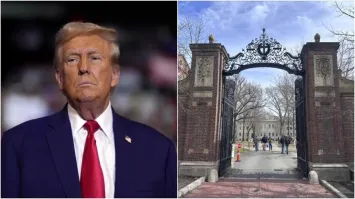Harvard University filed a lawsuit against the Trump administration on Monday, April 21, escalating the battle between the prestigious institution and the former president.
The University is challenging the administration’s attempts to withhold federal funding and impose political oversight on its operations, particularly related to its admissions policies, hiring practices, and political stance.
The lawsuit, filed in a Massachusetts federal court, claims that the Trump administration’s actions violate both the First Amendment and federal laws. It describes the government’s efforts as “arbitrary and capricious” and argues that they represent an unlawful use of federal funding to influence academic decision-making at Harvard and other targeted universities. The lawsuit seeks to have the funding freeze and other imposed conditions on federal grants declared unlawful and to recover legal costs.
The Trump administration has been engaged in a broader campaign against several elite universities, accusing them of tolerating anti-Semitism on campus.
This includes claims about protests against Israel’s war in Gaza, which the administration linked to anti-Semitic rhetoric. Harvard responded by disciplining students involved in those protests, including placing 23 students on probation and denying degrees to 12 others.
Trump has publicly criticized Harvard, stating on his social media platform that the university is a “joke” that “teaches Hate and Stupidity” and should no longer receive federal funds. He has also frozen $2.2 billion in federal funding to the institution in retaliation for its refusal to accept government oversight.
Harvard, in its lawsuit, affirmed its commitment to combating anti-Semitism and other forms of discrimination, stating that it is actively implementing reforms to address these issues. The lawsuit argues, however, that the administration’s blanket freeze on funding affects research unrelated to anti-Semitism, including medical, scientific, and technological studies.
The Trump administration’s move comes amid ongoing tensions with academia over claims that universities are too left-leaning and favor minority groups in their programs. Harvard’s stance, particularly its refusal to accept government intervention in its academic independence, places it at the center of a larger debate about the role of politics in education and the autonomy of higher learning institutions.


